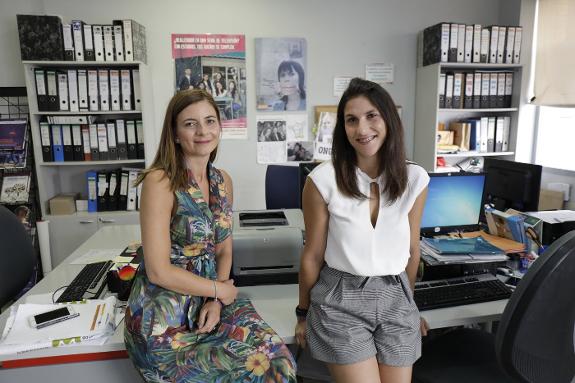

Secciones
Servicios
Destacamos

AMANDA SALAZAR
Monday, 8 October 2018, 11:08
Sonia Cortés and Jennifer Amador are responsible for the two most important programmes of the Gypsy Secretarial Foundation in Malaga, working towards the development and integration of the "gitano" community and the acceptance of their culture. Both women have university degrees, professional careers and are gypsies. Both are also breaking the stereotypes attached to gypsy women and are encouraging young people of their ethnicity to work to achieve their goals and to fight for equality.
Cortés (Granada, 40 years old) has a degree in Sociology, gives career advice and is also the coordinator of the Promotion Plan for the European Social Fund which is celebrating it's 10th birthday this year. The fund's aim is to aid young gypsy people with their studies.
The programme has managed to reduce the numbers of young gypsies leaving education early, and has also made accessing the jobs market easier for them. "Gypsy families are very aware of the importance of education and this has changed many things throughout the community," points out Cortés.
Before, only boys could think about finishing compulsory education but now the outlook goes beyond that. "It is important that all young gypsies realise there are other options for them and that they can choose; not everyone has to go to university but you can begin to prepare for it," she adds.
Jennifer Amador (also born in Granada, 27 years old) has a degree in Primary Education. She later gained a masters in History and Secondary Education.
Additionally, she is the technician at the Calí equality programme, which is the first centre to help gypsy women get onto the career ladder. "I have never felt at a disadvantage in my family, simply because I am a woman, and I want to study and succeed," says Amador.
She is an example of a gypsy woman who by being educated, trained, in work and financially independent, is breaking the more traditional mindset of the community. "When girls begin to study they realise there are so many other options beyond getting married and having children very young. With an education, the good thing is that they can decide for themselves their futures," Amador explains. "Many gypsy parents want their daughters to be educated but they also want them to be married young; I tell them that being married or having a partner should not stop a young woman from pursuing her dreams," she adds.
Silent revolution
"The move towards equality for women should include gypsy women because we have a lot to say and contribute," says Amador. The gypsy woman "cannot remain permanently on the outside of this debate because we suffer a double discrimination, for being women and for being a gypsy," Cortés adds.
The gypsy community is seen to be very patriarchal, with women being the fundamental support in the home. "The image of the care-giving, submissive woman is the total opposite of reality; we carry the weight of the home and the decisions of our futures in this silent revolution," claims Cortés.
There is still much to do and say to improve the sharing out of domestic tasks, but, as with the rest of the Spanish community, steps are being taken.
'My father never did anything in the house and now he divides the tasks; this is happening much more now as more and more women are working away from home," she explains.
Publicidad
Publicidad
Publicidad
Publicidad
Esta funcionalidad es exclusiva para registrados.
Reporta un error en esta noticia

Debido a un error no hemos podido dar de alta tu suscripción.
Por favor, ponte en contacto con Atención al Cliente.

¡Bienvenido a SURINENGLISH!

Tu suscripción con Google se ha realizado correctamente, pero ya tenías otra suscripción activa en SURINENGLISH.
Déjanos tus datos y nos pondremos en contacto contigo para analizar tu caso

¡Tu suscripción con Google se ha realizado correctamente!
La compra se ha asociado al siguiente email
Comentar es una ventaja exclusiva para registrados
¿Ya eres registrado?
Inicia sesiónNecesitas ser suscriptor para poder votar.